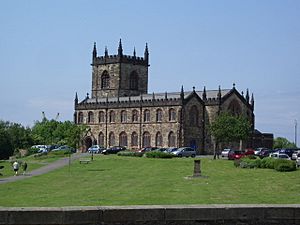St Michael's Church, Workington facts for kids
Quick facts for kids Workington Parish Church |
|
|---|---|
| The Parish Church of St Michael, Workington | |

View of St Michael's Church from the southeast
|
|
| Lua error in Module:Location_map at line 420: attempt to index field 'wikibase' (a nil value). | |
| OS grid reference | NX 99734 28956 |
| Location | Workington, Cumbria |
| Country | England |
| Denomination | Anglican |
| History | |
| Status | Parish Church |
| Dedication | St Michael |
| Past bishop(s) | Rt Rev'd Graham Dow |
| Architecture | |
| Functional status | Active |
| Heritage designation | Grade II* |
| Designated | 6 June 1951 |
| Architectural type | Church |
| Administration | |
| Parish | Workington |
| Deanery | Solway |
| Archdeaconry | West Cumberland |
| Diocese | Carlisle |
| Province | York |
St Michael's Church, Workington is a special church in the town of Workington, Cumbria, England. It is known as the parish church, which means it serves the local community. The church is part of a larger group of churches in the area.
Contents
The Church's Long History
Early Beginnings and Viking Times
The oldest part of St Michael's Church dates back to around the year 1150. We know this from a marble plaque inside the church. This plaque also tells us that the first leader of the church was named Walter.
But even before 1150, there might have been an older building on this spot. Some clues suggest a monastery was here in the 600s. A monastery is a place where monks live and worship.
We also know that Vikings were in this area a very long time ago. Finds from the Viking Age show that people lived near the River Derwent's mouth long before the 1100s. Old writings from the 1000s describe monks from Lindisfarne arriving in Workington. They were carrying the bones of St Cuthbert to keep them safe. This happened after Vikings destroyed the kingdom of Northumbria in 875. It is thought the monks stayed at the monastery where St Michael's Church now stands. Then, they left by boat.
Building for Worship and Protection
The church built in the 1100s was typical for places near the Anglo-Scottish border. It was made for both worship and protection. It had a simple main hall, called a nave, and a chancel, which is the area around the altar. It also had a strong, fortified tower. You could only get into this tower through the nave. The bottom part of this old tower is still part of the church today.
The church served the local people, who were mostly fishermen and farmers. It was also important to the Curwen family. They were the local lords of the manor, meaning they owned much of the land. Inside the church, you can see statues of Sir Christopher Curwen and his wife. These statues are from around 1450.
Rebuilding After Fires
Much of the church was rebuilt in 1770. However, in 1887, a big fire destroyed a large part of it. The church was rebuilt over the next three years. It was also decorated again in 1938.
Sadly, fire struck again in 1994. This time, the church had to close for seven years. It was finally reopened and rededicated in 2001. This shows how important the church is to the community, as they kept rebuilding it after each disaster.
More to Explore
- Grade II* listed buildings in Cumberland
- Listed buildings in Workington

